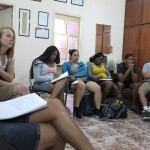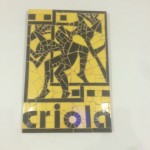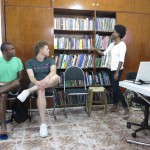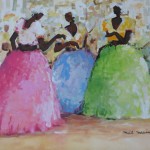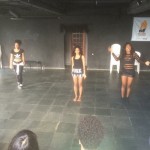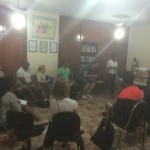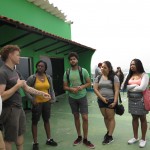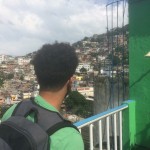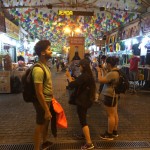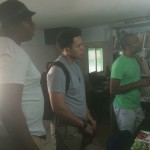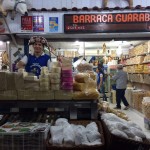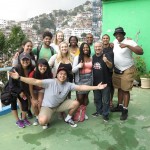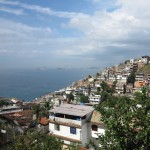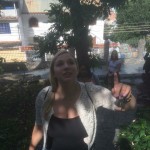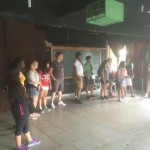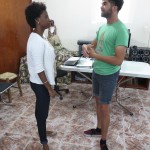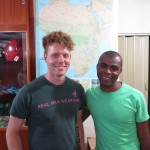May 30, 2015
By: Alejandro Heredia and Ravonelle Yazzie
We were out the door by 10 a.m., headed for the favela named Vidigal. The favelas, or the “slums”of Rio de Janeiro, are made up of “largely less literate, urban, historically oppressed populations” (Goldstein 2013: 4). Since our course focuses on racial, gendered, and class inequality, we were eager to visit this community, where some of the city’s marginalized and poor people live.
At the Favela, we visited the association named Nos Do Morro, or “We From the Hill.” This cultural association provides an artistic space for children and young adults in its community. Nos Do Morro’s center is in a large green house on a hill, and it includes a stage for performance art rehearsal, a psychologist’s office, a social worker, and the only public library in the community. The association is particularly recognized for making theatre productions from William Shakespeare’s body of work, and for sending many of their actors off to work in soap operas and films. In fact, many of the actors from the critically acclaimed film “City of God” were trained by Nos Do Morro.
After our visit to the performance art center, we had lunch at a local restaurant. We ate white rice, black beans, roasted chicken, vegetables, and fried manioc (yucca), amongst many other dishes. Lunch at this community was very different from our other meals. We were far away from the tourist sites, the beach, and the hostel. Here, we were surrounded by people that embraced the waitresses when they walked into the restaurant, laughed at familiar jokes, and sat at a long table with other community members, even if they ate their lunch quietly.
We left Vidigal after lunch, and headed for our next destination. Our next stop was a Black women’s organization named Criola. This organization focuses on training black girls, teens, and women of all walks of life and identities to fight against the oppressions that might restrict their freedoms, such as sexism, racism, and homophobia. Further, the organization aims to educate black women about the laws and policies that affect their lives, so that they can be as informed as possible in their fight for liberation. Our instructor contextualized inequality in Brazil by telling us anecdotes and real life cases that have occurred throughout the nation, including an instance in which a Black woman was shot by the police in her own neighborhood, and then dropped out of the back of a police vehicle and dragged down the street when they attempted to drive her to the hospital. In the end, our instructor stressed that despite the fact that black women experience intersectional oppressions, these women already have many of the tools they need to challenge the structures that oppress them. The organization’s job, according to our instructor, is to help educate them so that they can apply their skills to a larger social/political context.
After the informative talk, we took a bus ride to the Sao Cristovão Market/Feira, a northeast Brazilian cultural center where Brazilian sweet treats, restaurants, trinkets, and live music are displayed for all to enjoy. Of the thirteen of us, we split up into two groups and maneuvered through the shops. Every time we walked by an eatery, the host would come out to invite us to their respective restaurant. After a half an hour, we met back together and ate at an all-you-can-eat restaurant. This “buffet” was no ordinary buffet, instead of going to the food, the food was brought to us. After more than ten rounds of dishes, we asked the waiter to slow down. In time, we finished our dinner with one of Professors Brito’s favorite desserts, cocada, a combination of coconut and sugar.





